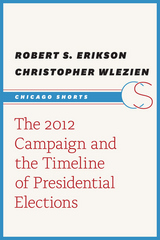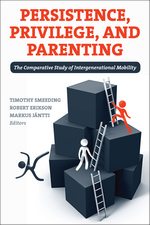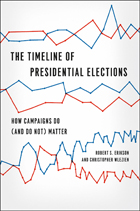3 books by Erikson, Robert

The 2012 Campaign and the Timeline of Presidential Elections
Robert S. Erikson and Christopher Wlezien
University of Chicago Press, 2014
Do voters cast ballots for the candidates whose positions best match their own? Or does the race for president come down to who runs the most effective campaign? In their book, The Timeline of Presidential Elections, published in 2012, Erikson and Wlezien documented how both factors come into play. Having amassed data from national polls covering presidential elections from 1952 to 2008, they could track how outcomes take shape over the course of an election year. But they wanted to know whether Barak Obama’s historic 2012 campaign would follow the same pattern.
This e-book both presents the central arguments from Timeline and updates the statistical analysis to include data from 2012. The authors also use the 2012 presidential campaign as a test of the empirical patterns they found in the previous fifteen elections. They show that Obama’s campaign conforms to their projections, and they confirm that it is through campaigns that voters are made aware of--or not made aware of--fundamental factors like candidates’ policy positions that determine which ticket will get their votes. In other words, fundamentals matter, but only because of campaigns. The 2012 Campaign and the Timeline of Presidential Elections will be useful in courses on the election process.
[more]

Persistence, Privilege, and Parenting
The Comparative Study of Intergenerational Mobility
Timothy Smeeding
Russell Sage Foundation, 2012
Americans like to believe that theirs is the land of opportunity, but the hard facts are that children born into poor families in the United States tend to stay poor and children born into wealthy families generally stay rich. Other countries have shown more success at lessening the effects of inequality on mobility—possibly by making public investments in education, health, and family well-being that offset the private advantages of the wealthy. What can the United States learn from these other countries about how to provide children from disadvantaged backgrounds an equal chance in life? Making comparisons across ten countries, Persistence, Privilege, and Parenting brings together a team of eminent international scholars to examine why advantage and disadvantage persist across generations. The book sheds light on how the social and economic mobility of children differs within and across countries and the impact private family resources, public policies, and social institutions may have on mobility. In what ways do parents pass advantage or disadvantage on to their children? Persistence, Privilege, and Parenting is an expansive exploration of the relationship between parental socioeconomic status and background and the outcomes of their grown children. The authors also address the impact of education and parental financial assistance on mobility. Contributors Miles Corak, Lori Curtis, and Shelley Phipps look at how family economic background influences the outcomes of adult children in the United States and Canada. They find that, despite many cultural similarities between the two countries, Canada has three times the rate of intergenerational mobility as the United States—possibly because Canada makes more public investments in its labor market, health care, and family programs. Jo Blanden and her colleagues explore a number of factors affecting how advantage is transmitted between parents and children in the United States and the United Kingdom, including education, occupation, marriage, and health. They find that despite the two nations having similar rates of intergenerational mobility and social inequality, lack of educational opportunity plays a greater role in limiting U.S. mobility, while the United Kingdom’s deeply rooted social class structure makes it difficult for the disadvantaged to transcend their circumstances. Jane Waldfogel and Elizabeth Washbrook examine cognitive and behavioral school readiness across income groups and find that pre-school age children in both the United States and Britain show substantial income-related gaps in school readiness—driven in part by poorly developed parenting skills among overburdened, low-income families. The authors suggest that the most encouraging policies focus on both school and home interventions, including such measures as increases in federal funding for Head Start programs in the United States, raising pre-school staff qualifications in Britain, and parenting programs in both countries. A significant step forward in the study of intergenerational mobility, Persistence, Privilege, and Parenting demonstrates that the transmission of advantage or disadvantage from one generation to the next varies widely from country to country. This striking finding is a particular cause for concern in the United States, where the persistence of disadvantage remains stubbornly high. But, it provides a reason to hope that by better understanding mobility across the generations abroad, we can find ways to do better at home.
[more]

The Timeline of Presidential Elections
How Campaigns Do (and Do Not) Matter
Robert S. Erikson and Christopher Wlezien
University of Chicago Press, 2012
In presidential elections, do voters cast their ballots for the candidates whose platform and positions best match their own? Or is the race for president of the United States come down largely to who runs the most effective campaign? It’s a question those who study elections have been considering for years with no clear resolution. In The Timeline of Presidential Elections, Robert S. Erikson and Christopher Wlezien reveal for the first time how both factors come into play.
Erikson and Wlezien have amassed data from close to two thousand national polls covering every presidential election from 1952 to 2008, allowing them to see how outcomes take shape over the course of an election year. Polls from the beginning of the year, they show, have virtually no predictive power. By mid-April, when the candidates have been identified and matched in pollsters’ trial heats, preferences have come into focus—and predicted the winner in eleven of the fifteen elections. But a similar process of forming favorites takes place in the last six months, during which voters’ intentions change only gradually, with particular events—including presidential debates—rarely resulting in dramatic change.
Ultimately, Erikson and Wlezien show that it is through campaigns that voters are made aware of—or not made aware of—fundamental factors like candidates’ policy positions that determine which ticket will get their votes. In other words, fundamentals matter, but only because of campaigns. Timely and compelling, this book will force us to rethink our assumptions about presidential elections.
[more]
READERS
Browse our collection.
PUBLISHERS
See BiblioVault's publisher services.
STUDENT SERVICES
Files for college accessibility offices.
UChicago Accessibility Resources
home | accessibility | search | about | contact us
BiblioVault ® 2001 - 2024
The University of Chicago Press









